Step back in time with our complete guide to Dubai's most captivating traditional souks. From the world-famous Gold Souk with its dazzling displays to the fragrant alleyways of the Spice Souk, we reveal where to find the most authentic market experiences. This 2024 guide goes beyond the obvious to uncover hidden gems like the lesser-known Perfume Souk and Textile Souk, complete with insider bargaining tips and cultural etiquette advice. Learn how to navigate the maze-like lanes of Deira's old souks, identify quality merchandise, and discover where locals shop. Whether you're hunting for 24k gold jewelry, exotic spices, or unique souvenirs, our guide helps you experience these historic markets like a pro while avoiding common tourist pitfalls.
Famous Souks in Dubai: What to Buy & How to Save Money
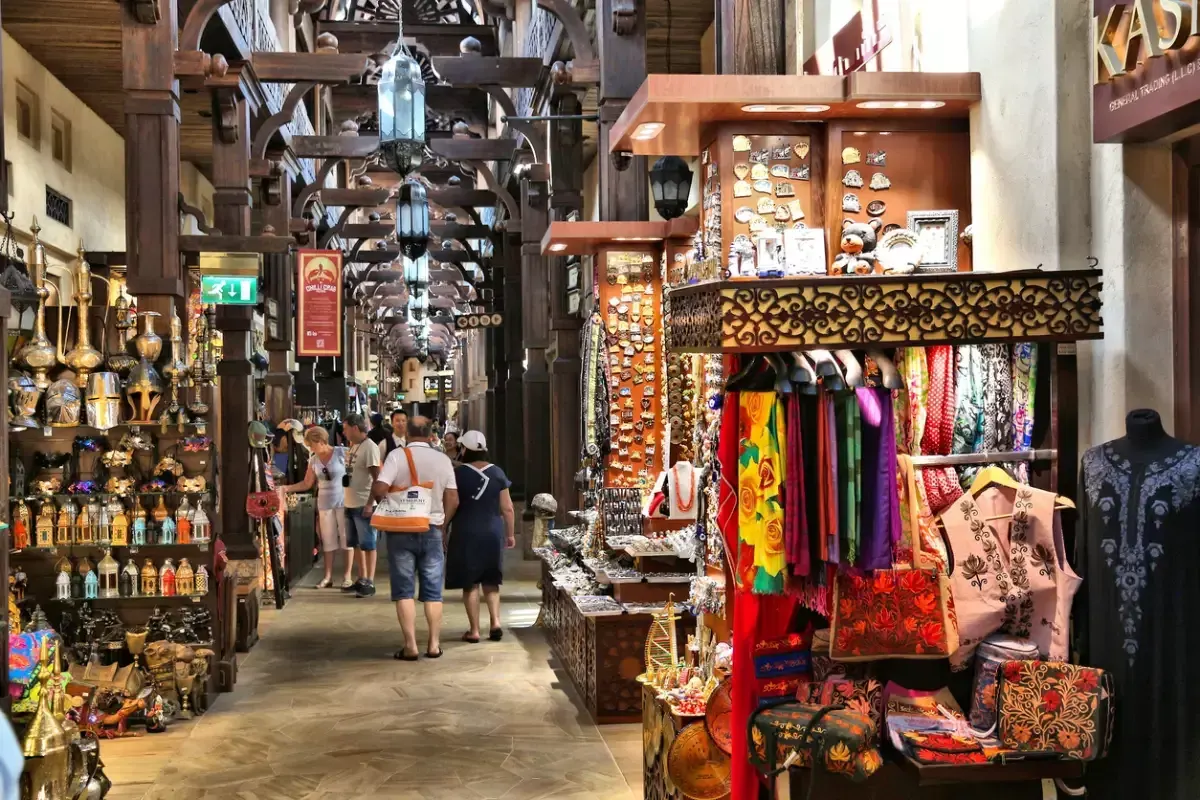
Souks in Dubai offer you a vibrant shopping experience where tradition meets luxury in the most captivating way. The word "souk" simply means "market" in Arabic, but there's certainly nothing simple about their cultural significance or the treasures they hold. Each winding alleyway presents a tapestry of scent, sparkle, and cultural richness, making these markets among the most authentic places to visit in Dubai.
Wondering what to buy from Dubai's famous markets? You'll find lavish gold jewelry, handwoven fabrics, traditional perfumes, and special souvenirs all under one roof. In the Gold Souk, gold averages AED 110 per gram, while the Spice Souk offers aromatic treasures ranging from AED 10 to AED 25 per pack. For luxury items, oudh can cost anywhere between AED 1,000 to AED 40,000, while Persian rugs typically start from AED 400. Additionally, the art of bargaining isn't just permitted at these markets—it's expected!
As you explore your Dubai tour, often called the "City of Gold", these traditional markets provide a glimpse into the emirate's rich heritage. From breathing in the heady aromas of saffron, oud, and rose petals at the Spice and Perfume Souks to examining intricate Pashmina shawls starting from AED 250, each souk specializes in specific goods—a tradition that continues today. Whether you're a seasoned shopper or first-time visitor, this guide will help you navigate the 13 most famous souks in Dubai, teaching you what to buy and how to save money along the way.
Check out Memphis Tours' travel packages and Dubai Tours now!
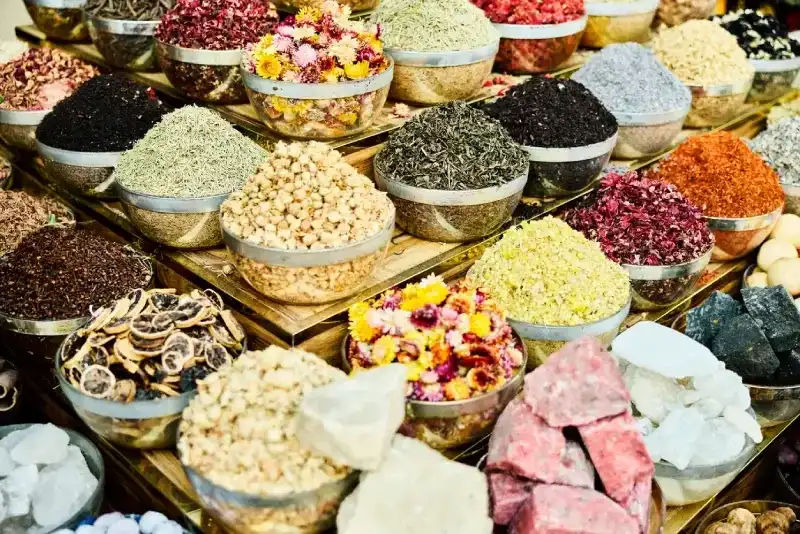
Gold Souk
The glittering spectacle of Dubai's Gold Souk stands as a testament to the city's reputation as the "City of Gold." Located in Dubai's commercial business district in Deira, in the locality of Al Ras, this traditional market has become one of the most iconic souks in Dubai. Bordered by the Dubai Fish and Vegetable Market to the north and the Deira Corniche near Baniyas Square, the Gold Souk is easily accessible via the Al Ras Metro Station.
Gold Souk location and ambiance
The Gold Souk consists of over 380 retailers lining narrow lanes, most of whom are jewelry traders. Walking into this dazzling marketplace feels magical as the glitter of gold fills the air with wonder. The bustling environment creates an authentic Middle Eastern shopping experience where some shops are four decades old, while others are relatively new.
For convenience, you can take an inexpensive abra ride across Dubai Creek to reach the Gold Souk, allowing you to combine your visit with nearby attractions like the Bur Dubai Grand Mosque and Al Fahidi Historical Neighborhood. The souk operates from 9:30 AM to 9:30 PM every day, except on Fridays when it opens from 4 PM to 9:30 PM.
What to buy at Gold Souk
As one of the world's largest gold markets, the Deira Gold Souk offers an unparalleled selection of gold items. The major items available include:
1. Gold jewelry in 24K (purest form), 22K, 21K, and 18K varieties
2. Platinum pieces
3. Diamond jewelry
4. Silver items (less common)
From traditional Arabic designs to contemporary masterpieces, you'll find statement necklaces, exquisite earrings, and bespoke wedding rings. Furthermore, there are uniquely crafted items you'd never imagine could be made of gold, from decorative shoes to homewares.
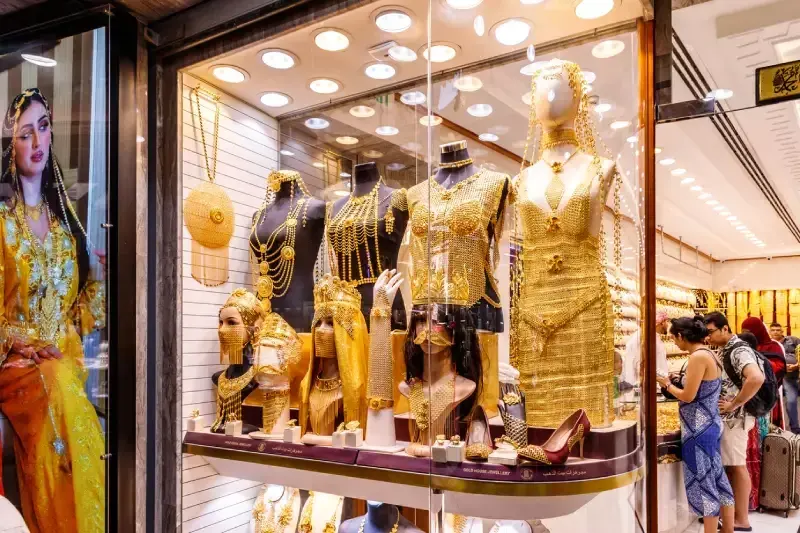
Customize Your Dream Vacation!
Get in touch with our local experts for an unforgettable journey.
Plan Your TripSpice Souk
Step into the aromatic world of Dubai's Spice Souk, where centuries of trading history come alive through vibrant colors and intoxicating scents. Located in the historic district of Deira, adjacent to the Dubai Gold Souk, this traditional market sits in the locality of Al Ras on Baniyas Street, near the Old Souk abra station on Dubai Creek.
Spice Souk location and ambiance
The Spice Souk comprises several narrow lanes lined with both open and closed-roof stores. Unlike the modern malls of new Dubai, this centuries-old marketplace preserves authentic charm amidst the city's futuristic skyline. Home to more than 150 small retailers, the souk creates a sensory extravaganza where giant cinnamon sticks, whole Sichuan peppercorns, and colorful mounds of herbs spill from large baskets at every turn.
To reach the souk, you can park at the RTA carpark in front, use nearby parking at Dubai Museum in Bur Dubai and take an abra across Dubai Creek, or arrive via Al Ras Metro station with a five-minute walk. For those coming from New Dubai, the RTA ferry from Dubai Marina Mall station offers a scenic route with skyline views.
What to buy at Spice Souk
The range of spices at this market is practically boundless, primarily imported from India, Pakistan, Iran, and other Middle Eastern countries. Notable purchases include:
1. Saffron: Available in three grades – negin (strongest, ideal for fragrant tea), sargol (used for cooking), and pushal/pushali (lower strength)
2. Arabian favorites: Sumac (deep purple spice with lemony tartness), zaatar (mixture of sesame seeds and herbs), and ras el hanout (North African spice medley)
3. Aromatic treasures: Baharat (spicy blend for meat and stews), cardamom (approximately 40-60 AED per 100g)
Beyond spices, you'll discover dried fruits (from 20 AED per 500g), nuts, Arabian-style incense burners, oud, and bakhoor (agarwood chips soaked with jasmine and sandalwood).
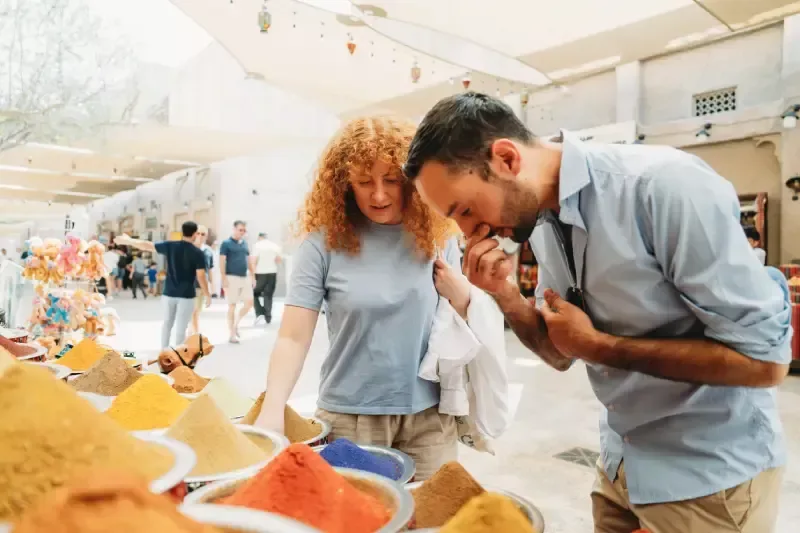
Grand Souk (Al Dhagaya)
Established in 1850, the historic Grand Souk (Al Dhagaya) preserves Dubai's trading history through its beautifully restored architecture and diverse offerings. Located just steps away from the Spice Souk in Deira, this traditional marketplace showcases original Arabian design elements with over 220 refurbished historic building facades.
Grand Souk location and ambiance
The Grand Souk sits on Al Abra Street in Deira, near the Dubai Museum in Bur Dubai. Its strategic position near the harbor area historically made it a vital trading hub where merchants received goods from ships arriving from Africa and the Indian subcontinent. Recently renovated, the souk offers a more organized shopping experience while maintaining traditional elements like wooden lattice work and wind towers.
Inside, you'll find a vibrant atmosphere with numerous shops and stalls operating daily from 9:30 AM to 9:30 PM (Saturday to Thursday), and from 4:00 PM to 9:30 PM on Fridays. The air-conditioned sections provide welcome relief from Dubai's heat, creating a comfortable shopping environment.
What to buy at Grand Souk
This marketplace serves as a one-stop destination for both traditional and contemporary items:
1. Traditional crafts: Ceramic art, traditional Arab shoes, colorful shawls, and Persian rugs
2. Cultural treasures: Distinctive Emirati artistry including Al-Sadu (Bedouin weaving with geometric patterns) and Talli (decorative embroidery using gold and silver threads)
3. Gold and jewelry: Beautiful pieces from skilled goldsmiths at competitive prices
4. Everyday items: Toys, household goods, electronics, clothing, bags, and shoes
5. Food items: Spices, herbs, and dry fruits
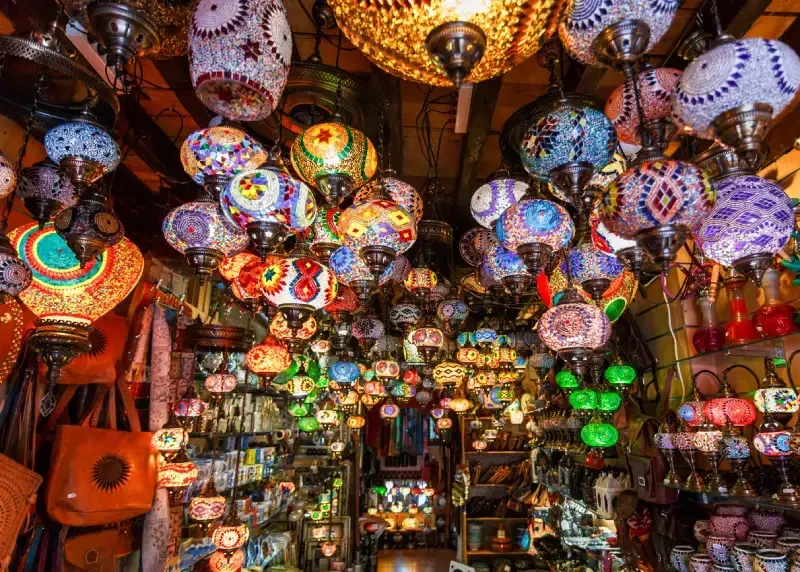
Meena Bazaar
Wander through the bustling lanes of Meena Bazaar, Dubai's vibrant "Little India" where colorful storefronts and authentic South Asian treasures create an atmospheric shopping adventure. This historic marketplace has been a favorite shopping destination for both residents and tourists seeking textiles, jewelry, and cultural artifacts at competitive prices.
Meena Bazaar location and ambiance
Nestled in Bur Dubai between Al Fahidi Street and Khalid Bin Al Waleed Road, Meena Bazaar is easily accessible via the Bur Juman metro station. The marketplace reportedly got its name from the signboard of one of its first stores established in 1973. As you explore the area, you'll notice the microcosm of Indian and Pakistani culture with bright lights and people buzzing around the shops.
The vibrant atmosphere resembles a shopping neighborhood in Delhi, India, where "Meena" is a popular regional girl's name. Actually, the traditional meaning refers to an annual fair for women organized during the Mughal empire. Today, the marketplace retains its lively character with small lanes full of shops selling everything from fabrics to electronics.
What to buy at Meena Bazaar
This colorful marketplace offers an impressive array of goods:
1. Jewelry: Visit established shops like Malabar Gold and Diamonds, Khushi Jewelers, and Meena Jewelers for gold items and gemstones
2. Traditional clothing: From Pakistani embroidery at Bareeze to Indian attire including semi-stitched and readymade outfits
3. Textiles: Explore Regal Fabrics for imported materials and artistically created patterns
4. Food: Sample authentic Indian street food including spicy vada-pav, jalebis, golgappas, and samosas
Subsequently, you can also find furniture, ceramics, perfumes, spices, and electronics throughout the marketplace.
Meena Bazaar shopping tips
Primarily, carry sufficient cash as most outlets don't accept credit cards or online transactions. Furthermore, bring your own shopping bags since the stores typically don't provide carry bags.
Be vigilant with your belongings as pickpocketing is unfortunately common in this busy market. For a less crowded experience, consider visiting in the afternoon when it's relatively quieter.
The marketplace operates daily from 9:00 AM to 10:00 PM, giving you ample time to explore this cultural treasure in the heart of Dubai.

Global Village Souks
Journey to a world of wonders at Global Village, Dubai's seasonal shopping extravaganza where cultures from across the globe converge in one vibrant marketplace. Unlike traditional year-round souks, this multicultural festival operates annually from October to April, offering a completely different shopping experience on any trip to Dubai.
Global Village Souks location and ambiance
Situated on Sheik Mohammed bin Zayed Road (E311) at Exit 37 in Dubailand, Global Village spans an impressive 17.2 million square feet. The venue features 30 pavilions representing more than 90 cultures, creating a remarkable international shopping atmosphere. Operating hours run from 4:00 PM to 11:30 PM daily, with extended hours until 12:30 AM on Thursdays and Fridays. Entry tickets cost a modest AED 15 (approximately USD 4) per person.
Each pavilion serves as a gateway to cultural treasures, with architectural elements that transport you to different corners of the world. For instance, the Morocco pavilion welcomes visitors with a replica of the famed Bab Al Mansour gate adorned with intricate geometric patterns.
What to buy at Global Village
The shopping options at Global Village are truly global in scope:
1. Cultural artifacts: Handcrafted items, souvenirs, antiques, and artwork that reflect rich heritage
2. Regional specialties: Moroccan tea sets, Dead Sea beauty products from Jordan, saffron from Iran, and Persian rugs
3. Fashion and textiles: Embroidered textiles, colorful fabrics, leather goods, and traditional clothing
4. Food products: Turkish baklava, pistachios, aromatic teas, spices, and dried fruits
At every turn, you'll discover unique treasures impossible to find elsewhere in Dubai, from authentic Japanese porcelain teacups to African handwoven baskets.
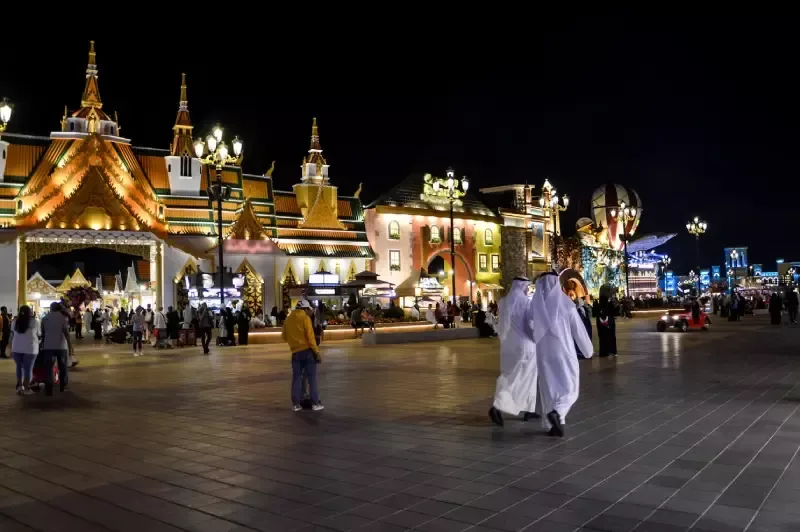
You can discover more in the Dubai travel guide
Dubai's famous souks stand as living museums where traditional commerce thrives alongside modern luxury. These vibrant marketplaces offer far more than just shopping opportunities—they provide windows into authentic Emirati culture often missed in glittering malls. Whether wandering through the dazzling displays at the Gold Souk, breathing in exotic aromas at the Spice Souk, or hunting for textiles in Bur Dubai, each marketplace delivers its own unique treasures and experiences.
Regardless which souks you choose to explore on a trip to Dubai, these colorful marketplaces reward curious travelers with unique finds impossible to discover elsewhere. From handcrafted jewelry to aromatic spices, personalized perfumes to intricate textiles—Dubai's souks preserve centuries-old trading traditions while embracing their role as essential stops on any Dubai itinerary. Take your time, sharpen your bargaining skills, and prepare to bring home treasures that capture the essence of this fascinating emirate.
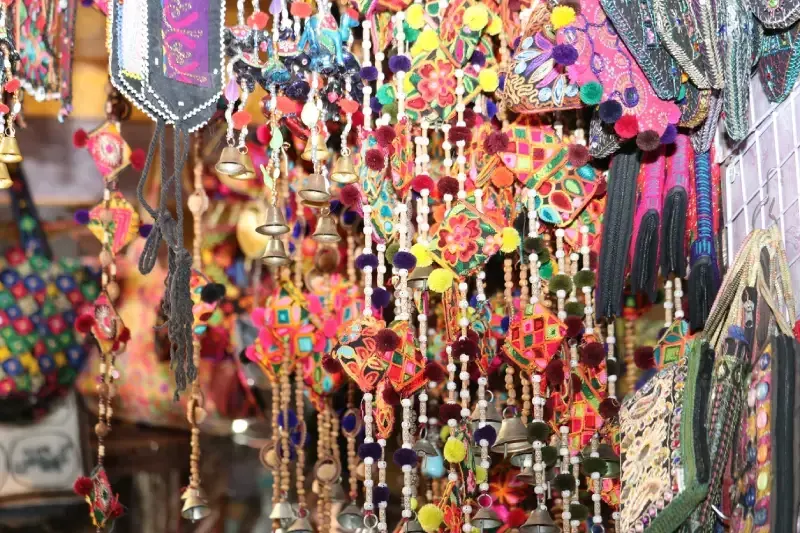
Popular buys include attar perfumes, gold jewelry, hookah pipes, pashminas, Arabian coffee, spices, and souvenirs. Souks brim with authentic local treasures.
Bargaining is key in souks,start 40–50% lower and negotiate. Visit weekday mornings for fewer crowds and better deals. Cash is preferred by vendors.
Some modern souks accept cards, but cash is best, especially in traditional markets. Local currency ensures smoother shopping with small vendors.
For an authentic experience, explore Deira’s Gold, Spice, and Perfume Souks, or the Textile Souk in Bur Dubai, rich in Dubai’s trading heritage.
Deira’s souks offer an authentic, bustling vibe with narrow alleys, while Souk Madinat Jumeirah blends tradition with modern shops, dining, and entertainment.
